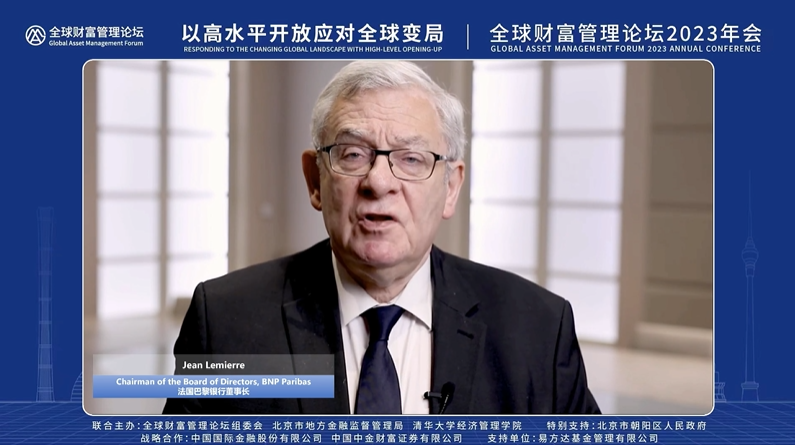法国巴黎银行董事长乐明翰:经济恢复所面临的三大挑战及投资建议
Jean Lemierre表示,各国政府和央行受新冠疫情影响,面临诸如供应链困难、消费下降等问题。现在,全球正摆脱过剩流动性局面,经济得到了合理保护。通胀问题在美国和欧洲尤为严重。为解决这一问题,美联储和欧洲央行已开始采取行动。欧洲能源危机和能源转型紧密相关。能源转型为欧洲提供了加速解决能源依赖问题和实现能源多样化的契机。他表示,法国巴黎银行长期支持能源转型,与客户合作并投资于相关行业,并对中国积极应对疫情和气候变化挑战,承诺出台强有力的政策支持能源转型表示赞赏。他认为,这是一个充满问题和困难的时代,但我们应该把眼光放长远。加大对新能源、基础设施、能源以及节能和适应性项目的投资,将为社会、国家和人民创造价值,也为投资者创造价值。我们需要保护储蓄,稳中前进,勇于创新,解决真正的需求。

今天能够与大家在全球财富管理论坛2023年会上就资产管理和投资等领域进行交流,我感到非常荣幸。本次论坛对中国及世界都十分重要,我们可以讨论并更好地了解当前发生的事情。接下来,我会分享我对宏观经济的看法,以及有关投资的观点。
我们正在走出新冠疫情危机,这场危机席卷全球。从人道主义和经济角度来看,危机造成了严重经济紧张和巨大灾难。当然,各国政府和央行已经采取了许多措施来保护人民和经济。但是,我们也遇到了困难,供应链出现困难,消费一度减弱,为了帮助经济恢复,央行和政府提供了大量的货币和流动性支持。
因此,我们正在走出流动性过剩的局面,经济体系得到了适当保护。然而俄罗斯与乌克兰之间爆发冲突对诸多方面造成影响。其中一个是能源紧缺。2022年能源价格上涨,这种情况将会持续一段时间。但我们正在走出这个困局,向好的方向发展。虽然人们对未来仍然存在疑虑,但我强烈感受到,世界正积极地走出这个困局。
但我们仍然面临一个主要挑战,那就是通货膨胀。通胀在美国和欧洲已经发生,未来也可能在中国出现。当为了支持人民生活和企业所需出现流动性过剩时,经济就会陷入紧张局势,供应难以满足过高需求,就会导致通货膨胀。因此,欧洲和美国都面临着通货膨胀问题,美联储和欧洲央行决定采取行动,尽快减轻通胀。但人民和经济有可能付出代价,因为减轻通胀的过程中可能会出现某种程度的经济放缓。但可以看到,美国如果成功摆脱通货膨胀,就会出现经济反弹。增长可能不强劲,但是过程中会有复苏和增长。欧洲也面临类似情况,即使其反弹程度稍落后于美国,但欧洲央行正努力应对通货膨胀。
另一个挑战来自能源。俄乌冲突使得欧洲能源形势严峻,但欧洲已采取相关措施来应对能源挑战。目前冬季能源供应已经得到保障,明年冬季将会延续相关措施。并且欧洲正在采取结构性措施来适应能源供应并实现能源供应多样化。因此,即使在未来几年内可能会面临挑战,欧洲也会成功应对。
当然,中国也受到了疫情冲击。我看到中国正回归正常状态。企业正在复工,一切都在回归正常。银行账户中有大量存款,因此,我们有强劲的消费潜力。中国也会解决摆在大家面前的挑战。基于消费能力的技术投资以及投资成为大趋势,这对未来非常重要。同时,市场对中国的评价出现反弹,得益于消费,中国以建设性的方式走出了疫情。
简而言之,确实存在很多困难和挑战,全球经济存在分裂风险。但我认为全球贸易正在强势回归。所以,我的观点并不消极,因为我们知道如何以建设性的方式应对每一个挑战。当然,这很困难,可能代价高昂。我们需要适应,但我们可以做到,而且正在全力以赴去做到。只希望没有黑天鹅从天而降,对经济造成新的不利打击。但我希望能够以一种颇具建设性的方式应对当前形势。
除此之外,我们还面临一个新的关键挑战,那就是能源转型和 ESG。我接下来的讲话主要关于气候变化,但除了气候变化之外,还涉及包括生物多样性和社会问题在内的多个议题。但对于投资者而言,短期内最热门的毫无疑问是气候变化。我们要支持能源转型,世界不能再以现在的方式运作,这也是热点讨论话题。一系列缔约方会议的召开有助于进步,有助于人们更好地理解世界。
我们必须全力应对气候变化,必须积极支持能源转型,避免气候恶化和气候灾难。欧洲对此非常重视。俄乌冲突引起欧洲能源供应困难,导致能源危机,如果把它和能源转型放在一起看,可以发现这两者是相互联系的。能源转型给欧洲提供了加速解决能源依赖问题的强大动力和良机。
法巴银行非常重视也大力支持能源转型。我们与支持能源转型的客户合作,投资支持能源转型的行业。我们必须作出改变,如果我们不解决这些问题, 一些企业会面临风险。中国也在全球范围内做出了很大努力,中国已承诺出台强有力的政策,加入支持能源转型的行列。中国也有很多相关项目,并且我们也参与了其中一些,因此中国企业和中国政府为应对这些挑战所做的切实努力有目共睹。实现能源转型道阻且长,需要制定全面的政策措施,要具体问题具体分析,同时这也为投资者带来了独特机遇。
在这个时代,我们可以投资,也面临很多问题和困难。投资时应该优先考虑什么?投资时会遇到困难,优秀的投资者知道如何解决问题并做出正确决策。货币政策正在发生变化和调整。但现在我们可以投资企业,投资股权,用来支持生产、创造就业、促进贸易和增长,走出困难,实现经济回弹。从企业层面以及国家层面来看,现在的投资应该流向新能源、能源基础设施、以及节能和提高对能源的适应性上。
欧洲有很多值得投资的项目,中国也是一样。这个时代,储蓄可以用于投资新项目,这将为投资者创造价值,也将为社会、国家和人民创造价值。当然我们也需要擦亮双眼,保护人民和国家的储蓄,稳中前进。
但与此同时,我们还需要有开阔的眼界,勇于创新,解决真正的需求,因为只有真正的需求才能为未来创造价值。我们不应该过于目光短浅,只看眼前,而要放眼长远,遵循稳健投资的架构。我们认为投资者可以随着时间的推移增加稳健资产。可以跨境合作,在一定程度上形成竞争,只有通过竞争,投资者才能从市场获得最好的回报。法巴银行致力于与各位、与客户一起努力投资融资、寻找新项目,寻求为长期、可持续的投资制定规则。只有通过像全球财富管理论坛这样的平台讨论,我们才能了解如何向前迈进并为客户提供好的服务。
谢谢大家的聆听,预祝论坛圆满成功。
![]()
It is good to be with you today, your forum about asset management, about investment. In china, in the world is a very important forum. We need to have discussions and to understand better what's happening. In a few minutes, I shall try to share with you my views about what's happening at a macroeconomic level. And the conclusions we can make, at least for today about investment. We are getting out of a very unique situation, which is, on one hand, Covid crisis, has been all over the world, has created massive tensions catastrophes from a humanitarian point of view, but also from an economic point of view, of course governments, central banks have done a lot to protect people, to protect the economies all over the world.
But we have had difficulties, supply chain difficulties, consumption has been reduced for some time, and to support the economy, central banks and governments have spent money, have supported liquidity.
So, we are getting out of this situation of excess of liquidity, but the economic system has been reasonably protected. And then we have a war. We have a war between Russia and Ukraine, which has a lot of consequences. But one of them, I would like to mention today, is the energy tensions we have seen in 2022 prices of energy increasing, and it's going to be the case for some time. So, we are getting out of this very unique situation in a rather good situation, people have doubts about what may happen. My strong view is the world is getting out of this in a rather positive way. We have one key difficulty, at least in the United States, in Europe, and probably in China will come, which is inflation. When you have excess of liquidity, which was needed to support the people and the corporate sector, then you have tensions. Demand is too high. The supply has a difficulty to address the demand, which is coming, and you see inflation. So, we have inflation in Europe, we have inflation in the U.S, the decision of the Fed and the decision of the ECB is to fight back to try to reduce inflation as quickly as possible.
It may have a cost. It has a cost on the people. It has the cost on the economy, because we may have some kind of slowdown. But if I look at the United States, which I had the curve, I can see that if and when they succeed in getting rid of inflation, there will be an economic rebound. And growth can be maybe not strong growth, but growth, recovery is part of the process. In Europe, we have quite the same situation, even if we are slightly behind the American curve, we have inflation, the ECB does a proper job, and they fight back. We have another question, which is energy. The energy situation of Europe has been challenged by the war between Russia and Ukraine, it’s difficult, but measures are taken to address the energy challenge. The supply of energy has been made safe for the current winter, the same will be done for the next winter. And structural measures are being taken to diversify and adapt the supply of energy for Europe. So even if it is going to be a challenge for the years to come, it's going to be addressed by Europe a in a successful way.
China has been hurt, of course, by Covid. Everybody has in mind what has happened in the last weeks and months. I hope that China is going back to a more normal situation. What I see that companies are at work; the whole process is going back to normal. We see also massive deposits in banking accounts, massive savings. So the possibility of a strong consumption is ahead of us. And we support the economy, my guess is China will address the challenges everybody has. They will find solutions. But there is a strong underlying trend based on consumption capacity to invest in technology and to invest. And that's very important for the near future. Markets, by the way, have seen a rebound evaluation on china. The moment china has got out of Covid in a constructive way, thanks to consumption.
So, in a nutshell, yes, there are many difficulties, there are many challenges. There is a risk of some kind of fragmentation of the global economy. But I see that global trade is back and quite strongly. So, in a nutshell, my view is not negative. We know how to address each of these challenges. One by one, in a constructive way. Of course, it's difficult, can be costly. It requires adaptation, but it can be done, and it's being done. In a very strong way, every way. I simply hope that there will be no black swan coming from nowhere, creating a new blow to the economy that would be detrimental. But as it is today, I hope we can manage the current situation in a rather constructive way.
On top of this, we have a new challenge, which is key, which is the energy transition and ESG. I'll focus my remarks on climate, but there are many other questions than climate.You have biodiversity, you have the social questions, it’s a broad agenda, but the most topical one in the short term for investors is without any doubt, the climate change. We need to support energy transition. We cannot continue at the world level to operate the way we are today. There are many discussions about this. The successive COP meetings are extremely useful, and they bring progress and better understanding across the world.
And I think all of us, we understand that we have to be committed. We have to deliver in a very operational way to support energy transition and avoid climate damage and the climate catastrophe. Europe is much committed to this. And when I put together the energy crisis coming from the difficulty to get supply of energy in Europe because of the war between Russia and Ukraine and the agenda of energy transition, you can see that the two go together. Energy transition is a strong incentive for the Europe to speed up and address the question and the solutions to the debate about energy dependence. It's a very strong opportunity.
This is true for Europe. We in BNP Paribas, we are extremely committed to this agenda. We support a lot energy transition. This is what we do, working with clients and investing in sectors which do support energy transition. It's the same elsewhere. I see maybe in a different way, but a strong trend in the United States paying attention to these questions of energy transition. Because everybody understands well that we cannot continue to do this, that some businesses will be at stake, if we don't address these questions. And china is the same. China is much committed, at the global level. China has already committed strong policies to join the common effort to support energy transition. At the project level, there are many projects in China. We are part of some of them, so we know them, and we know the concrete efforts made by Chinese corporate sector and by the Chinese government to address these challenges. This is a broad agenda which has to be taken large policies, and also case by case, and it offers unique opportunities for investors.
I go to what is not my conclusion, but my remark to your forum. This is a time when we can invest. This is a time in which there are questions, there are difficulties. What should be the priorities? What is, there are disruptions. But good investors know how to address this and take the right decisions. Monetary policies are changing and adapting. But this is a time when we can invest, notably in the corporate sector, in equity, support, production, job creation, trade, growth, and rebounding after the difficulties we have had. This is a time when it is needed to invest into new sources of energy, into infrastructure, for energy, and into energy saving and adaptation. This is the company level and the country level.
In Europe, you are going to see many projects for good investments. And you are going to see the same in China. This is a time when savings can be invested into new projects, which will create value for society, for the countries and the people, and which will create value for the investors. We need to have open eyes, and we need to be, of course, aware of the need to protect the savings of the people and of the country and to move forward in a safe way.
But at the same time, we need to have open eyes and to be creative to address the real needs, because only the real needs will create value for the future. And we shouldn't be too much short sighted looking at the what's happening in the immediate sphere, but have a longer- term view, which can be the framework, and which is the framework of sound investments. These remarks hopefully are positive. We think investors can grow sound assets over time. We can do it. Cross border, working together, to a certain extent competing because it's only through competition that the best would get out of the market for the investors. But we can do it. BNP Paribas is much committed to doing so, working with you, with clients, to try to see how to finance investments, how to find new projects, and the same way, how to define rules, for long term, sustainable investment. I hope these words will help the discussions you are going to have, because it's only through this type of discussions and forum as the one in which you are today, that we shall see together how to move forward and to deliver well for clients. Thank you for listening. And I wish you very good discussions.

